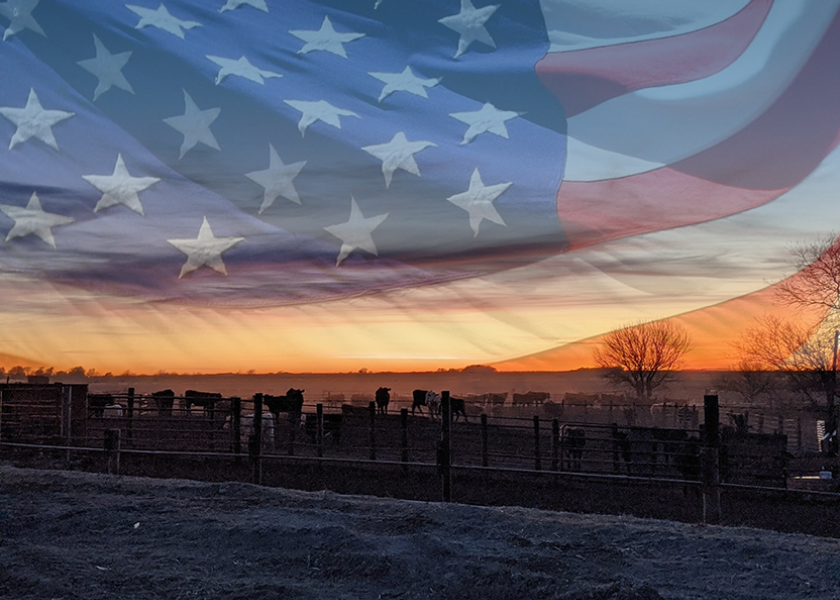'Quit Making Money on the Backs of American Producers.' USDA Proposes U.S. Beef Labeling Updates

Seen as a point of contention for many U.S. cattle producers, an proposed update to meat labeling requirements was recently released by the USDA, closing the “loophole” that allows imported meat to be repackaged in the U.S. and given a “Product of USA” label.
Justin Tupper, president of the United States Cattlemen’s Association (USCA), joined AgriTalk host, Chip Flory, to discuss the proposal.
Closing the Loophole
“U.S. Cattlemen, clear back in 2019 asked for this loophole to be closed up. Now, keep in mind labeling is voluntary,” Tupper notes. “What was going on, and we had seen many instances of this, [packers] were able to bring in product from another country, bring it to the United States, repackage it, and then label it ‘Product of the USA.’ We clearly felt that this was a disservice to the producer and absolute disservice to the consumer. And it could be a food safety issue by not knowing where it comes from.”
After petitioning USDA in 2019 to make changes, Tupper says this update is “real progress, even though it’s a little late.”
Currently, both trim and whole muscle meat products qualify to be repackaged in any way to earn the “Product of USA” label. Tupper explains this deception as “something the packers could use to their advantage to buy cheaper product” and bring it to the tables of U.S. consumers.
Potential Issues
While the updated labeling claim requirements are welcomed by many U.S. cattle producers and USCA, Tupper is aware that there will likely be some issues to be worked out, specifically with imports from Canada and Mexico.
According to the USDA press release, “The proposed rule allows the voluntary “Product of USA” or “Made in the USA” label claim to be used on meat, poultry and egg products only when they are derived from animals born, raised, slaughtered and processed in the United States.”
Tupper notes, cattle that are shipped to Canada to be fed, like many in the northern states, will not meet the requirement of this rule. Though, regarding the World Trade Organization (WTO), Canada is not necessarily the issue.
“There's a lot of those cattle that go back and forth, especially across the northern border. That, I think, is a non-issue. They have high health protocols. They definitely have the same standards in the slaughter industry as we do, if not higher,” Tupper says. “I think when we look at the issues of where does the issue come in, especially when it comes to the WTO, we have no issues to the north. We have some issues to the south. Whether it be health protocols, whether it be quality credit protocols, there's some different issues there.”
Voluntary, Yet Effective
While it’s important to note that this labeling will be voluntary, Tupper is encouraged that packers will “quit being able to make money on the backs of American producers, using our good name.”
Additionally, Tupper says any price premium for true U.S. beef will be left up to the consumer.
“I think as a producer and as USCA, we want to produce the highest quality, safest protein in the world, and we do that. I think we want to make sure we protect that. My belief is that the consumer will pick that and that's where when we get into the talk about the northern cattle up in Canada, and we talk about quality and price and all those things—they're equal. I think that if we were labeled, everything was labeled, ‘Product of USA,’ ‘Product of Canada,’ ‘Product of Mexico,’ ‘Product of Brazil,’ then the consumer would have a choice.”
There is a large misconception that all “Product of USA” beef was truly born, raised, slaughtered and processed in the U.S., Tupper says, and it’s not that cattle producers in favor of country-of-origin-labeling are trying to be “isolationists” or are trying to “root out the competition”—it comes down to safety and a quality product.
Play By the Same Rules
A recent Atypical BSE case in Brazil ignited the fire for many cattlemen groups, including USCA, the National Cattlemen’s Beef Association (NCBA) and R-CALF USA, urging the U.S. government to halt beef imports from the country.
Brazil’s inability to “play by the same rules” is a concern for Tupper.
“They don't play by the same rules as us. So, we have no idea the transparency that's going on,” he adds. “They've been caught in child labor laws here in the States and in Brazil. They've been depopulating rainforest. They give every reason to make sure that we don't take any Brazilian beef, whether it be in boxes, or live or any other way, and we just haven't acted on it. Again, we're not asking to be isolationist, if they want to play by the same rules as us. That's fine. But if they don't, then there has to be action.”
Read More:
USDA Seeks to Limit Use of ‘Product of USA’ Label By Packers
Timely BSE Report in Brazil? U.S. Beef Imports Left Unphased







